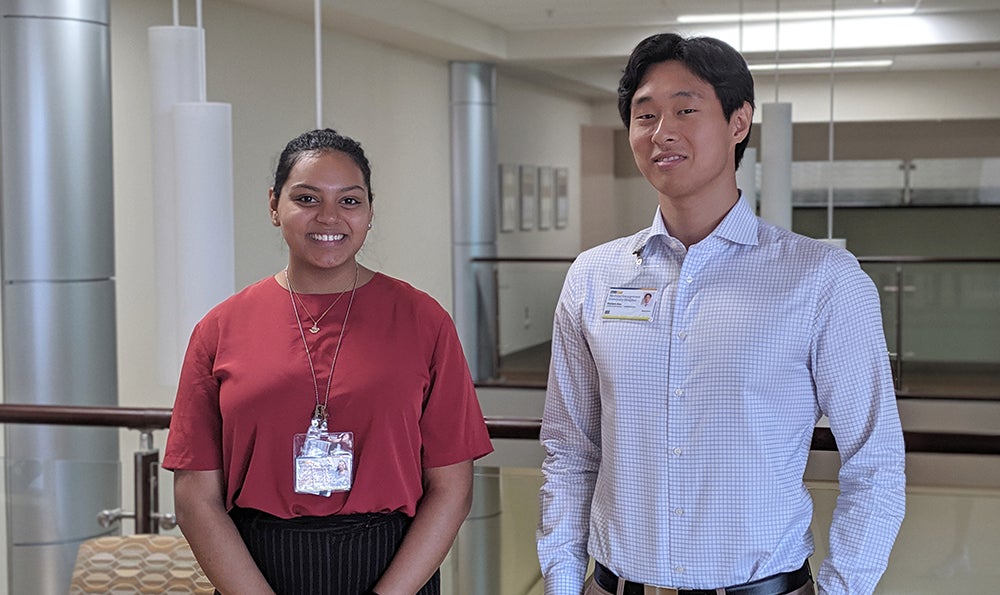Ruesch Center Offers Summer Interns an In-Depth Look at GI Oncology

Posted in Lombardi Stories | Tagged cancer research, Ruesch Center
(July 9, 2019) — As one of 12 summer interns at Georgetown University’s Ruesch Center for the Cure of Gastrointestinal Cancers, aspiring medical student Antara Sarkar has had the opportunity to learn about all aspects of GI oncology, from medical research to patient care.
“It’s been a really incredible experience to get to see cancer care from so many different angles,” says Sarkar, a senior at Case Western Reserve University in Cleveland.
Petra Prins, MSC, PhD, clinical research and fellowship program manager at the Ruesch Center, runs the eight-week-long internship during June and July. While the internship has existed for a while, Prins says she and her colleagues decided to add more structure to the program around five years ago. The 12 students are divided into four groups of three, with each group rotating between shadowing physicians, radiologists, pathologists and surgeons, as well as helping with research projects and engaging with patients.
“What really differentiates our program from some others are the research and patient-oriented components,” says Craig Lustig, associate director of the Ruesch Center.
Although shadowing is the major component of the program, students have participated in several research projects over the years that have been presented at different international meetings like ASCO GI in San Francisco.
In the past, as part of the patient-oriented component, interns participated in writing patient education content for the center’s website as well as for flyers and presentations, but this year a different approach was formed. The team found 12 current patients who were willing to share their cancer journeys with the students. Each intern is paired with a patient and sits in on their appointments and treatments. “The idea is for the students to understand the patient perspective,” says Prins. “What does a cancer diagnosis do to someone, how does the patient experience the care they get?”
The number of applicants continues to increase each year, making the program more selective than ever. Applicants attend schools around the country and are typically undergraduates on the pre-med track or first-year medical students. “We look for a variety of factors when selecting students, including a keen interest in oncology,” says Prins. While the bulk of applicants intend to be physicians, the program is also open to people who hope to become other experts in the health field, such as nurses or nurse practitioners.
One of the highlights for Sarkar has been the opportunity to be in the operating room. “I got to see how the surgeon got a tissue sample, and then how the pathologist examined it under a microscope to make a diagnosis,” she says. The program has also piqued her interest in GI cancers versus other forms of the disease. “So that’s really been eye-opening for me and widens my options for when I go to medical school.”
Richard Shin, who graduated from Columbia University in 2018 with a degree in data science, will be applying to medical schools once he completes his pre-med requirements. He appreciates all aspects of the program, among them the chance to help with a research project on liver cancer led by medical oncologist Aiwu Ruth He, MD. His group has been helping her to prescreen candidates and determine their eligibility to participate in a clinical trial.
“To be able to get my name on a research paper and have the chance to network with such reputable doctors — and hopefully get some recommendations from them — will be a vast help when I apply to medical schools,” says Shin. “There are very few internships out there that can offer what the Ruesch Center is offering.”
Another meaningful part of the internship has been the opportunity to shadow patient John Bateman, who was diagnosed with Stage IV colorectal cancer in 2018 and is currently undergoing chemotherapy. Shin is in the room with him during his biweekly appointments, after which he heads over to the infusion center with him and keeps him company for a while.
From Bateman’s perspective, he appreciates the company and having Shin explain some of what’s going on. “There’s something in it for both of us,” he says.
Prins and Lustig find it satisfying to see students come from all different schools, go through the program, and take what they’ve learned at Georgetown out into the world.
Sarkar adds: “It’s just so incredible to get the full-picture experience of cancer care. Hopefully that will contribute to us becoming knowledgeable, as well as compassionate and empathetic, health care providers.”
